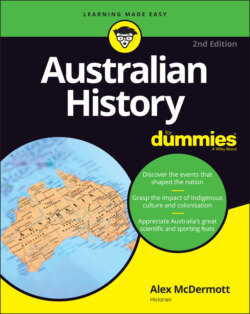Читать книгу Australian History For Dummies - Alex McDermott - Страница 88
Pardoning convicts
ОглавлениеKing instituted a world first in punishment — he began letting convicts go free, conditionally, before their time had expired. This was the first time that what would become known as parole was experimented with anywhere in the world. In NSW, it was called ticket of leave. He also introduced conditional pardons, which were valid in the colony only. King’s rationale for initiating these pardons was again illustrative of the chief priority in these early years: Don’t worry about reforming the blighters, or punishing them either, just save us some money.
King wanted to get as many convicts off public rations as quickly as possible, and if a convict with skills turned up on the incoming shipload — a carpenter, say, or a builder, or a bookkeeper — or had connections and capital, then King would free him or her with a ticket of leave instantly.
In the early years of the colony, no-one cared about making sure convicts were actively punished after they were transported — the prevailing view was let them start earning money and look after themselves. The transportation itself, the act of exile, was seen as the major punishment (until word started leaking back to Britain that convicted felons were getting rich and doing what they wanted). As long as the convicts were transported, kept out of the way for the period of their sentence, and didn’t cost too much, no-one cared too much about how exactly they spent their time Down Under.
King offered his resignation in 1803 (the stresses of trying to maintain order in an unruly colony seemed to age him considerably) and his resignation was duly accepted.
